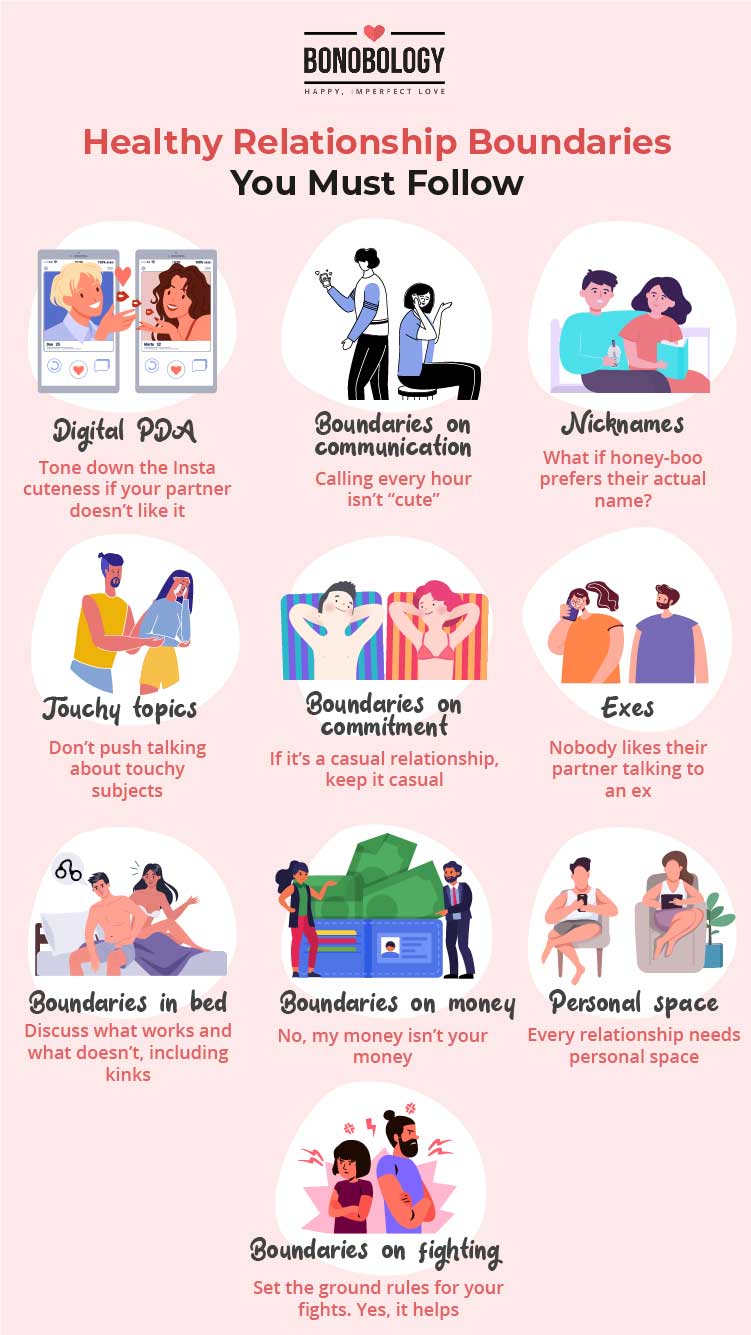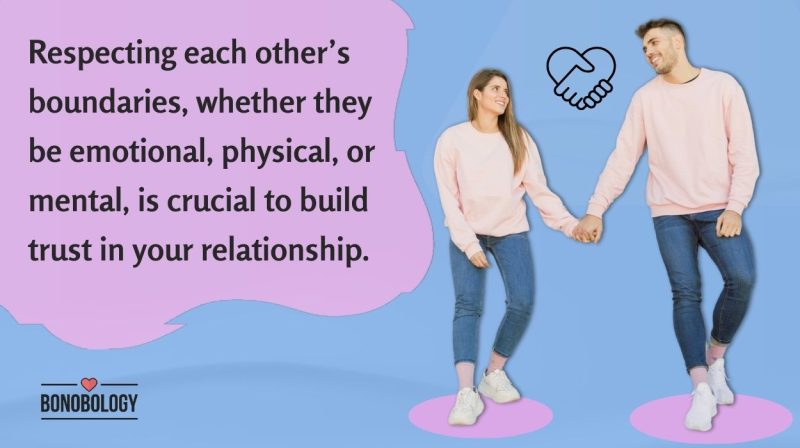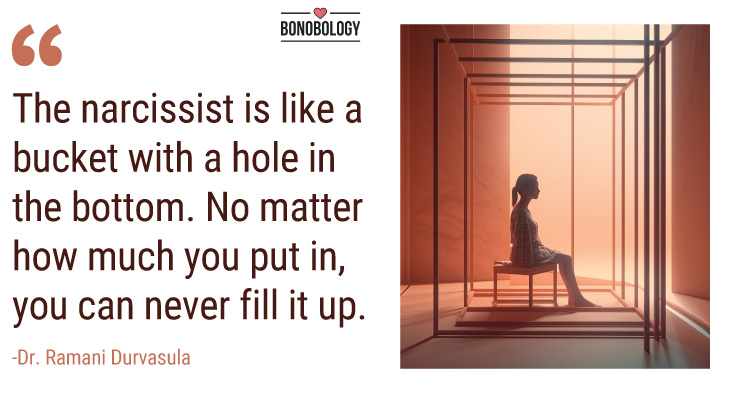Healthy relationship boundaries aren’t an ominous sign. Talking about setting boundaries in a relationship does not mean you are getting detached from your partner, even if the initial mention of it elicits an exasperated sigh in response.
When you’re in the honeymoon phase, setting boundaries in the relationship is sure to have slipped your mind. If you and your partner are open about everything (and I mean everything), you shouldn’t worry about the conversation hurting each other’s feelings.
Even though love is meant to bring you closer together, setting boundaries means making sure you both don’t end up being codependent. Let’s get into it and talk about all you need to know, with the help of psychologist Nandita Rambhia (MSc, Psychology), who specializes in CBT, REBT and couples counseling.
So, Why Do We Need Healthy Relationship Boundaries?
Table of Contents
Healthy relationship boundaries are not often discussed and they are not merely what you think is okay and what isn’t. Though it might seem like the hardest conversation to have, Nandita says “Most of the time, boundaries get automatically set as the relationship progresses.”
Confused about setting boundaries in romantic relationships? Let’s get down to the basics. If you’re the kind who does not, under any circumstances, pee with the door open in front of your partner, this one is going to be a treat for you.
Healthy relationship boundaries allow you to communicate what you want and need from the relationship. No, voyeuristic peeing does not count. By having a conversation with your partner about what’s okay and what isn’t, you’ll pretty much be making sure you minimize communication mistakes.
“Healthy relationship boundaries and expectations are important,” says Nandita. “Sometimes, we have to have a conversation and communicate our needs to set some ground rules for the relationship. This is important since you don’t want to lose your own identity as a person, yet maintain a healthy relationship,” she adds.
Boundaries give a sense of control to your life and let you be who you are, without jeopardizing the relationship. If you have an understanding partner, it will be easy to set healthy boundaries. Assuming you both don’t want to be merely defined as each other’s other halves, it’s vital to maintain your own personality.
Related Reading: 23 Little things to make your marriage stronger everyday
While in a relationship, we might be inclined to make life decisions for the benefit of the dynamic. As blessed as you might feel to have a partner who won’t shift to another city for an amazing job opportunity so that s/he can continue living with you, choices like that might have repercussions later.
You might be left feeling a tad guilty, while your partner might use his sacrifice as an excuse to gaslight you in the future. He might even throw this sacrifice in your face when you are being given a chance to be promoted and relocate to another city.
What Are Healthy Boundaries In A Relationship?
Setting healthy boundaries in a relationship means you can make decisions that benefit you and decisions that mean progress for you. Without feeling as though you’re being selfish, you’ll be able to convey to your spouse what kind of space you need to be happy.
For instance, there aren’t any hard and fast rules when it comes to how much you can handle your partner’s phone. You could pick it up if you see it beeping while they are in the washroom, but going through the phone to check messages might not be the best thing to do.
Sometimes, partners don’t understand that sharing has boundaries too. You can not go all out and share passwords and toothbrushes. When one person starts feeling suffocated and disrespected because of the constant intrusion, that’s when the healthy boundaries come in.
“Individual needs are different, hence boundaries will differ in every relationship,” says Nandita. “Important topics that are completely off-limits can be discussed. Such topics could include family, career, maintaining friendships, foul language, PDA, etc.
“What’s most important, though, is open communication and an earnest need to understand and respect the partner’s need for a particular boundary. This will be one of the pillars of a strong, happy, and healthy equation,” she adds.
Setting boundaries in romantic relationships is a must and that could also keep controlling partners in check. There are different types of boundaries in relationships, and what works for one couple will not necessarily work for another. The most important ones are the physical and emotional boundaries, but you can also set healthy relationship boundaries with in-laws, friends, and relatives.
Now, every person is different. The boundaries will vary from person to person. Let’s take a look at some common healthy boundaries to set in a relationship.
10 Healthy Relationship Boundaries To Strengthen Your Bond

Setting relationship boundaries may not seem like an important task because one feels the partner is aware of their likes and dislikes. Reality check: This is a mere assumption.
To let your relationship blossom, you will need to set healthy relationship boundaries clearly. Considering how comfortable you both are with each other, of course. You need to be clear about what you want and how you want things to be and not focus on adjusting here. That way, you already start a relationship on a compromise.
1. How digitally intimate are you going to be
Are you the Instagram PDA kind? Does your partner bombard you with notifications where he has tagged you and 49 others in a post about your relationship? Maybe you are the one into constant sharing cute selfies of your partner but your partner might not be.
Before opening up your relationship for the virtual world, set boundaries if both of you are okay with it. Perhaps your partner does not want to peddle the relationship to the masses.
Or you do not want your relatives or colleagues to berate you about your love life, just in case you’ve got nosy relatives or coworkers. Whatever the reason, you need to be clear about the limits. Talk about things you can and cannot share online about each other. You know what they say, once it’s on the internet, it’s always on the internet.
Related Reading: Next time you log in on social media, remember you are spoiling your relationship
2. Communication is important, but how often?
Adulting with a full-time job and a relationship can be time-consuming. Maybe you like constant communication throughout the day, perhaps a simple “Thinking of you” with an emoji fits the bill for you. Or maybe you like your job and would like no distracting texts while you work. Maybe your partner is the kind to call you at lunchtime because s/he wanted to listen to your voice.
Knowing what and how much to communicate should be one of the boundaries couples must enforce. Do you want your partner to check in on your girl’s night out? Or do you call several times when he is out of town at a business conference?
Nandita speaks about how limiting communication can be a good example of boundaries to set in a relationship. “When too much communication between the partners gets suffocating for one, it should be told clearly and precisely. Allowing alone time or me-time helps strengthen the bond and also builds trust over a period of time.”
This is one of the healthy boundaries you need to set because no one likes a nag. Choosing to ignore setting boundaries might be a red flag for the relationship.
3. Names you can call each other
Is cutie-patootie too cringy for you? Can you call each other babe in front of your friends? Or would you rather your partner stick to your real name? Communicate and decide the names you are allowed to call each other.
Most couples give sexy nicknames to each other and end up doing a lot of silly things that they feel are endearing. But if you end up assuming that your partner likes them as much as you do, you might be inviting trouble. You cannot really call your partner by your given nickname in front of his colleagues, can you?
When you’re thinking of some good relationship boundaries to have, nicknames might not be at the top of your list. But when you end up embarrassing your partner in front of their friends/family, you’ll wish you had this conversation long ago. So, keep your endearing names within the bedroom or use them on the romantic long drive, but definitely not beyond that.
4. Talk about the family
If you and your partner have been together for some time, chances are s/he knows about the familial problems you may have. If yours is a budding romance, however, new relationship boundaries such as not discussing the family at length might be a good idea.
It is healthy to set a boundary about how you talk about each other’s family. Is calling her mother “a judgmental shrew” taking it too far? Or is communicating a lot with one of his cousins not pleasing him? Make things clear to your partner about what you like and what you don’t so that they wouldn’t suddenly lash out once it gets too much.
You need to know how far along you are okay with your partner communicating with your family. Or calling them names, for that matter. If you are not on board with your partner talking about your family at all, it might be a good thing to set a boundary about that, since family can be a touchy topic.
5. What kind of commitment do you want?
Are you still window shopping for the perfect partner? This kind of boundary has to be set, especially if you are both unsure if you are the one for the other, or if you have just begun dating. The sooner you define the relationship, the better it will be for you.
For example, if you’ve defined your dynamic as a casual one, you wouldn’t really expect your partner to call you every hour of the day, right? And if they do, you might start to feel the need to set up a couple of boundaries. The types of boundaries in relationships don’t revolve only around a water-tight monogamous dynamic.
Do you want a monogamous relationship? Is your partner okay with an open relationship? Would you be in a polyamorous dalliance? Whatever the kind of commitment you are looking for, be clear about it in the beginning.

6. Boundaries with the exes
Are you not cool with your partner’s ex calling him/her at midnight? How often do they communicate with each other? If they are still good friends, is it okay for them to go out for an occasional lunch once in a while?
“Boundaries with exes is always a tricky thing. Ideally, being incommunicado with an ex is ideal, but it’s not possible many times. As a rule of thumb, the moment you start feeling insecure about how much your partner is in touch with an ex, it’s an issue which needs to be discussed,” says Nandita.
Setting clear boundaries with the ex makes your relationship smoother, leaving no space for insecurities or jealousy. Likewise, if you want to continue being in touch with your ex, you’ve got to set clear boundaries about that too.
7. Sexy times boundaries
Are you willing to do that freaky thing your partner likes in bed? The beginning of the relationship might be all hot and fiery. But setting clear sexual boundaries ensures you are not caught up with doing something in bed that you don’t want to do.
It will save you in the future from doing sexual favors to your partner that make you uncomfortable or leave you feeling violated. Out of all the possible types of boundaries in relationships, the ones governing what’s okay in bed and what isn’t might be the most important.
They might end up being the difference between healthy, consensual sex and something that makes you feel disrespected and abused. But if you are both okay with no boundaries, that is alright as well. Just communicate about the things you are willing and not willing to do.
8. Sharing is caring…but within limits
Maybe you don’t want to share your bank details with your partner. It isn’t about you not trusting them (or maybe it is), but more of a sense of security you have when you keep your passwords and pins to yourself.
Maybe your partner wants to set up a joint account and you are not comfortable with sharing finances just yet. Setting stark financial boundaries is important and should be talked about carefully to avoid financial infidelity. The same goes with sharing clothes or personal belongings. If your partner does not like you using his trimmer, you shouldn’t use it.
9. Alone time boundaries
Everyone, and I mean everyone, deserves alone time. Your partner might not be into spending every hour of every day with you and that’s quite healthy.
Even if you are the clingy kind who wouldn’t mind spending every waking hour with your partner, remember, space is vital for any relationship. So, if he wants to spend a Thursday evening playing Mortal Kombat with his friends, and you show up in your sexy bikini and beer, you are sordidly violating his alone time.
While you may be playing it off as being cute and wanting to spend time with your partner, they may not take it so lightly. Communicate with your partner about yours and his/her need for solo time and realize that time spent apart is naturally healthy for a relationship.

10. Fight boundaries
Set boundaries about how you are going to fight. Do you not like fighting in public? Settling disagreements with a lot of yelling and breaking stuff triggers unhealthy spots in your mind? How you choose to solve issues is an important boundary to set in a relationship.
Maybe your partner grew up around constant yelling and bickering from his parents and chooses to sit down and talk rather than scream and yell. Maybe you are the kind who chooses to talk about issues a few days later because you need time to cool down. Set clear boundaries about how you want to deal with problems in the relationship. And mind you, there are ways to fight respectfully as well. You’ll also need to set boundaries about how you can talk to each other when you are stressed out.
Neither is it easy to set healthy relationship boundaries nor is it easy to follow them. No matter how trivial a boundary may seem to you, it needs to be respected and it is IMPORTANT by all means. This may seem tough initially, but soon you and your partner will acquire the skill and your relationship will get stronger with time.
If you are currently struggling to establish healthy relationship boundaries and expectations, Bonobology has a multitude of experienced relationship counselors who would love to help you through the troubles your relationship faces.
Your contribution does not constitute a charitable donation. It will allow Bonobology to continue bringing you new and up-to-date information in our pursuit of helping anyone in the world to learn how to do anything.























Featured
50 Questions For Premarital Counseling To Prep For Marriage
Why Is Marriage So Hard? Reasons And Ways To Make It Worthwhile
15 Signs Of Being Married To A Narcissist And How to Cope
Building Healthy Boundaries: The Key to Trust and Respect in Relationships
How To Deal With A Negative Spouse – 15 Expert-Backed Tips
What Is A Codependent Marriage? Signs, Causes, And Ways To Fix
7 Signs You Have A Verbally Abusive Wife And 6 Things You Can Do About It
Emotional Dumping Vs. Venting: Differences, Signs, And Examples
Husband Wife Relationship – 9 Expert Tips To Improve it
12 Hurtful Things You Or Your Partner Should Never Say To Each Other
7 Expert Tips To Resolve Conflict In A Marriage
Rediscover The Spark: How To Fall Back In Love With Your Partner
3 Key Skills To Save Your Marriage & Stop Divorce
Roommate Marriage – Signs And How To Fix It
What To Do When Your Husband Belittles You
How To Deal With A Lying Husband?
Why Am I So Depressed And Lonely In My Marriage?
11 Signs You Have A Narcissistic Wife
21 Signs Of A Narcissistic Husband And How To Cope
7 Fundamentals Of Commitment In A Marriage